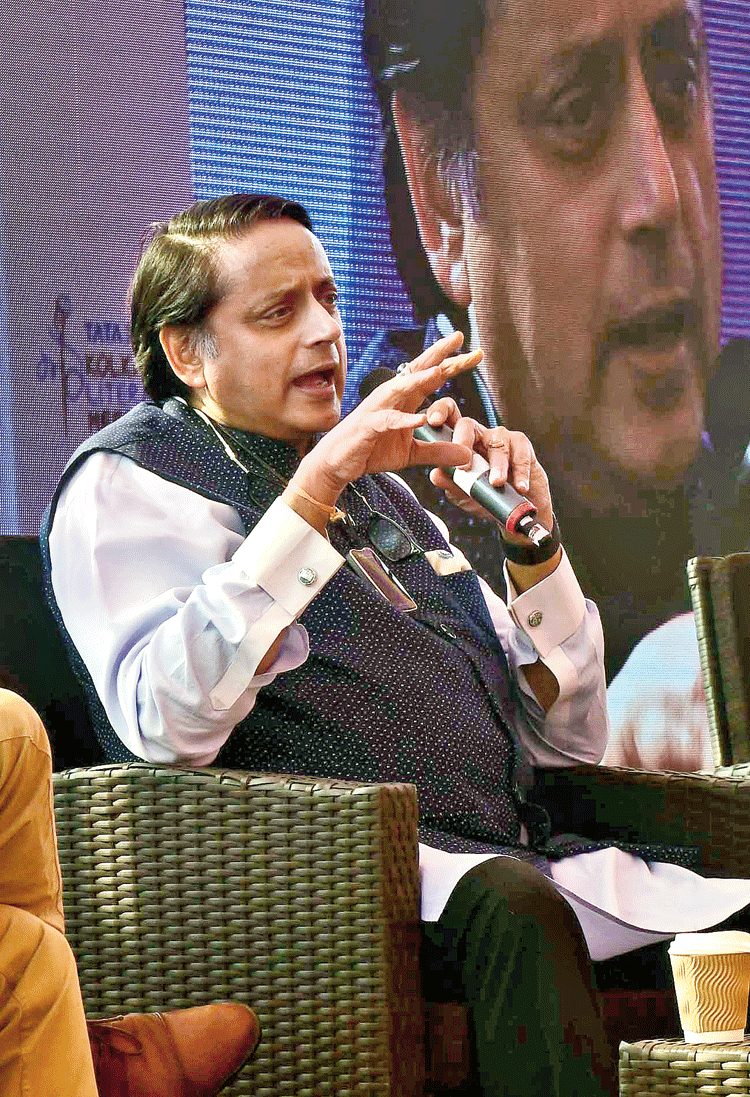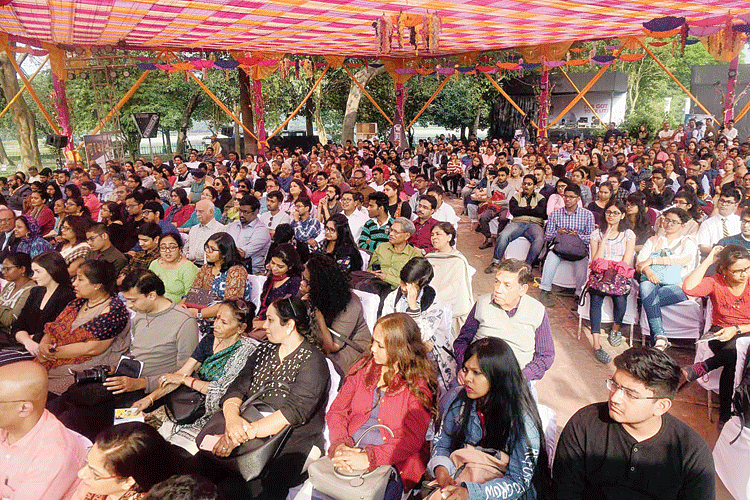
A packed house listened to the discussion
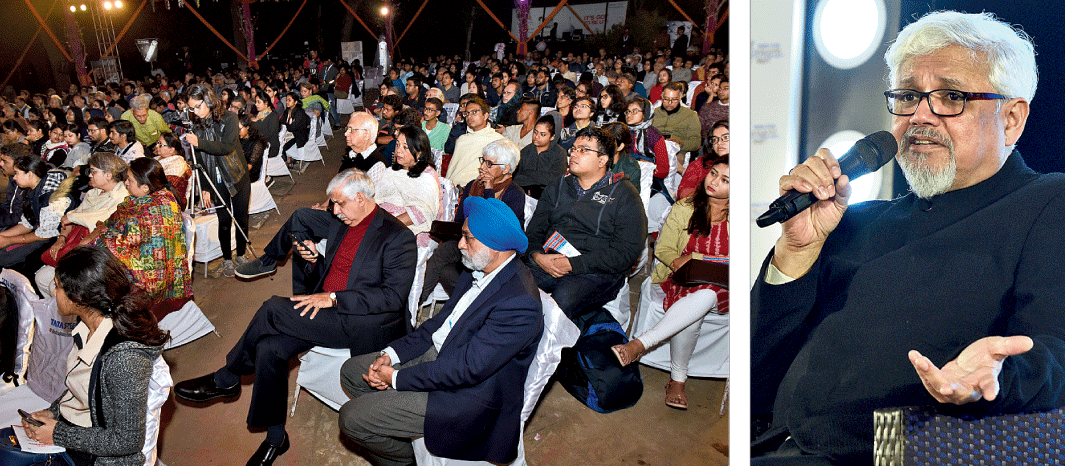
Author Amitav Ghosh speaks at the literary meet on 2020 Vision: Reading and Writing in India. The venue was almost bursting at the seams. An official of Victoria Memorial said they were forced to close the gate to the venue because there was no space even to stand
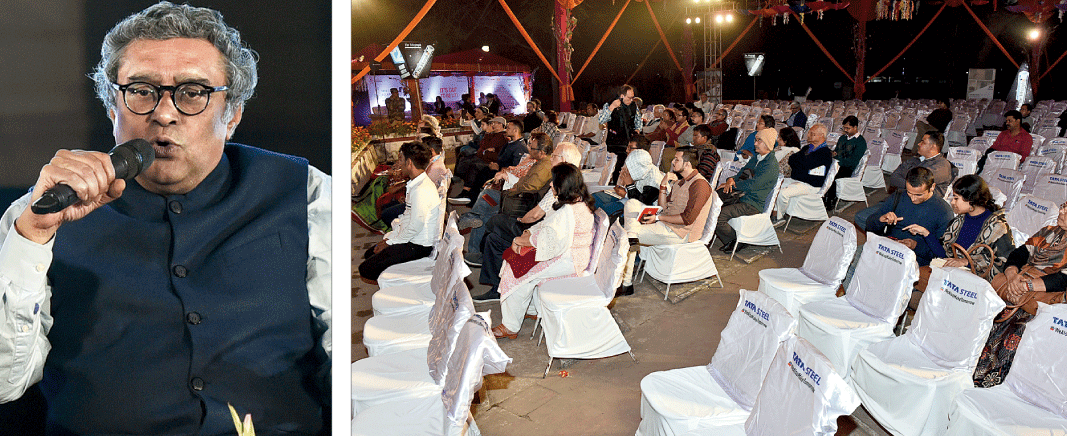
BJP Rajya Sabha member and author Swapan Dasgupta speaks at a session on Awakening Bharat Mata. With him was Visva-Bharati VC Bidyut Chakraborty. (Right) The audience during the discussion.
Across India, people protesting the new citizenship regime have often called their fight a second freedom struggle.
The argument is “not exaggerated”, feels parliamentarian Shashi Tharoor, “because what is going on in the country is an assault on the assumptions of the freedom struggle”.
Answering questions after a session at the Tata Steel Kolkata Literary Meet in association with Victoria Memorial Hall and The Telegraph, the Congress MP from Thiruvananthapuram, in Kerala, offered a scathing critique of how he thought the BJP government at the Centre was trying to subvert the ideas of the freedom struggle that were reflected in the Constitution.
“Our freedom struggle didn’t divide on ideological grounds. It wasn’t Marxists versus capitalists. It didn’t divide on geographical grounds. It wasn’t northerners versus southerners. It divided on one principle alone — should religion be the determinant of nationhood? Those who said yes… that was the idea of Pakistan.
“But Mahatma Gandhi… said no. Religion is not the basis for our struggle. Our struggle is for freedom and dignity and equality for all…. We will create a free country for everybody. The Constitution reflects that,” Tharoor said when Metro asked him during a question-answer round what he thought about the present-day protesters equating themselves with freedom fighters of the past.
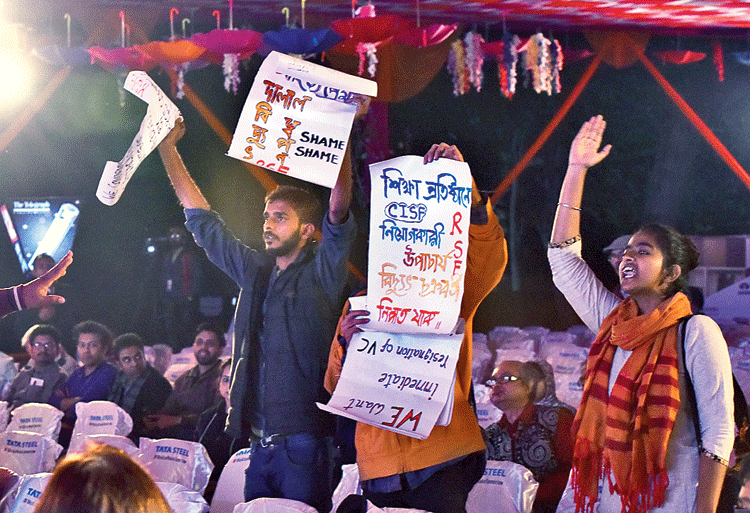
Students protest during Swapan Dasgupta’s session. They raised slogans against Dasgupta and the Visva-Bharati vice-chancellor. CISF personnel guarding the Memorial removed the protesters. Outside the East gate, which had been closed during Amitav Ghosh’s session, about 25 students shouted slogans continuously. “Dasgupta belongs to a fascist party and he is supporting CAA-NRC-NPR. So, we are opposing his presence at a literary meet,” said Joyee Roy, one of the protesters. The students also opposed Visva-Bharati’s plan to engage CISF on the campus. Dasgupta later said: “This was a lit meet. We discussed books, my book, the ideas behind the book. I think we had a slightly academic discussion on the subject. People should not find objection to it. But some people have misconceptions. They are completely entitled and within their rights to articulate their misconceptions somewhere else.... I am willing to discuss my ideas with anybody. But discussion, too, has to have a certain civility.”
The panellists spoke to a packed audience.
A young man in the audience compared a drop in India’s GDP during the British rule and under the current regime and then sought Tharoor’s opinion on a “wind of division like the colonial era”.
“Divide and rule, the British have done their job too well. They have essentially managed to implant in the minds of bigots throughout this country... the seeds of what this particular political party (BJP) and government are exploiting to divide us further… the real tukde tukde gang in this country are the people who are ruling us and dividing this country into bits and pieces on the basis of communal identity,” Tharoor said to applause from the audience.
Tharoor spoke of a “minister in the Modi government, a former army chief” who had gone to the Supreme Court “to say he doesn’t have a birth certificate and the date on which the army records his birth is actually wrong”.
In 2011, General V.K. Singh, the then army chief, had approached the Supreme Court seeking its intervention in his dispute with the Centre over his date of birth. His plea was turned down.
“If this is the reality for a minister in the government of India, can you imagine a poor Muslim in a slum in Mumbai? Can you imagine a rural person, a tribal person? Having to defend the fact that they are Indians. That is what this government has reduced us to. And so to defy and challenge that becomes a moral burden on everyone of us,” he said.
Less than 24 hours before Tharoor’s session, during a protest march in the city on Tuesday, a 62-year-old man told this newspaper that the people who fought for Independence “were revered by present and future generations” because they took a stand against oppression and injustice. “If we don’t protest against injustice today, how will we look our grandchildren in the eye?” the man had asked.
In Calcutta earlier this month, social activist Harsh Mander had called the protests against the CAA-NRC-NPR a “second freedom struggle to fight hate and discrimination”.
On Wednesday, Tharoor also spoke of religious discrimination. “People say the CAA merely grants citizenship to a few groups, how does that matter? It matters because for the first time, it introduces religion as a determinant of the citizenship and the absence of one religion as a disqualification for citizenship. That’s the real challenge with the CAA.”
During the session, Tharoor referred to his book An Era of Darkness, which asserts how disastrous the British rule was for India. With him on the dais was journalist-author Sudeep Chakravarti, whose latest book revisits the Battle of Plassey from a larger economic and political context, and Manu S. Pillai, historian and author of The Ivory Throne: Chronicles of the House of Travancore. The topic of the session was “When The Lions Write — Colony in Indian Ink”.

